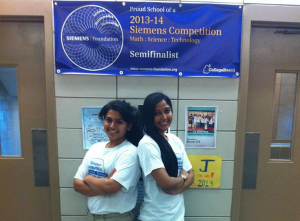

Photo taken by Phillip Porzio.
On October 18, seniors Solly Sebastian and Melinda Harbhajan were announced as semi-finalists in the Siemens Science Research Competition for their research on “Drug and Protein Encapsulation with Nanogels.” More than 2,440 students competed in this year’s prestigious Siemens Competition, with only 331 projects selected for the semi-finals. Solly and Melinda are the only Harrisites to be semi-finalists since 2006.
For their research, Solly and Melinda conducted an experiment testing the effect of nanogels (small gel-like structures) on the growth of E.coli cells, which are common bacteria found to cause infections. This experiment was designed to see if the nanogels could efficiently deliver the antibiotic “kanamycin” to combat the growth of bacterial cells.
“It was found that nanogels aid in the release of kanamycin to attack bacterial cells,” explained Solly. “This experiment is important because nanogels could be used as a new delivery system for drugs.”
The two students have taken science research class since sophomore year and worked at the Queens College Research Center with mentor and Queens College professor Uri Samuni from September 2012-2013. They also presented their research at Queens College for Undergraduate Research Day on October 8.
Under Dr. Samuni’s leadership, Solly and Melinda were able to conduct the experiments on their own and dedicated much time and effort to their project.
“Melinda and Solly are bright and talented students that have shown tenacity and dedication,” said Dr. Samuni. “For more than a year, regardless of inclement weather or school workload, they came to the lab after school, on weekends and during vacations.”
However, there were some challenges faced during experiments, such as the fear of contaminating the bacteria.
“You could do an experiment that lasts for six hours only to find out the next day you come in the results are very off from the previous experiment or the plates are contaminated,” said Solly.
Despite this, Dr. Samuni said that Solly and Melinda “showed an impressive mastery of the kinetic experiment, which requires multiple measurements and careful execution under time pressure without getting the samples mixed up or contaminated.”
Solly was ecstatic upon discovering that she and Melinda were semi-finalists.
“I ran to the sixth floor to tell Mr. Porzio first because he was always there for us from day one, starting from sophomore year,” she said.
Solly also wants to thank Assistant Principal of Math, Science, and Technology Susan Brustein for giving useful advice on their research paper. She is grateful to have worked with Dr. Samuni’s team, who guided her and Melinda in the right directions during the experiment.
Dr. Samuni emphasizes the scientific importance of the results of their experiment.
“Their research project is one that we are very excited about,” he said. “The announcement that their project won as semifinalists at the prestigious Siemens science competition is a validation of what we already knew – that they did excellent work!”
Looking to the future, Solly said she plans to continue her research by decorating nanogels with folate, an anti-cancer drug.
The Siemens Foundation is a non-profit corporation dedicated to providing scholarships and lifetime opportunities for talented mathematics, engineering, science and technology students across the United States. On their website, the Siemens Competition is described as the “nation’s most coveted teen science prize.”
Ms. Brustein is proud of Solly and Melinda’s achievement, saying, “They worked very hard and their research was deserving of this honor.”



























2012 • Nov 10, 2013 at 10:59 pm
Finally! Congratulations, this is fantastic!